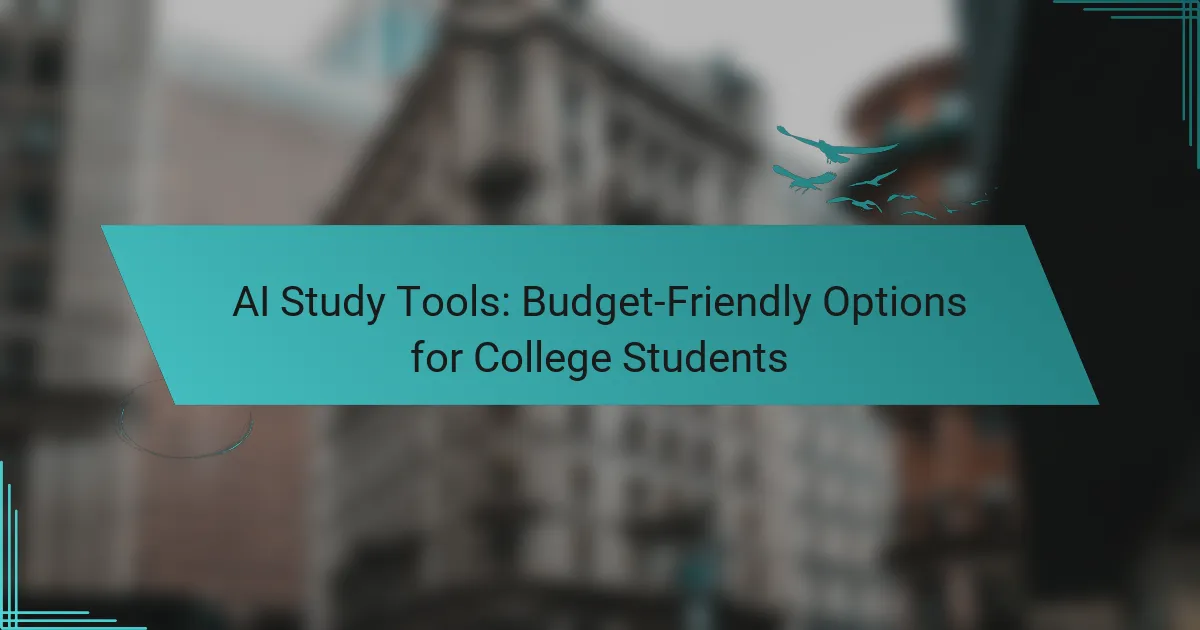Budget-friendly AI study tools can greatly enhance a college student’s learning experience without putting a strain on their finances. By offering free or low-cost options, these tools assist with writing, studying, and organizing notes, while also providing tailored educational experiences that adapt to individual needs.

What Are the Best Budget-Friendly AI Study Tools for College Students?
Budget-friendly AI study tools can significantly enhance a college student’s learning experience without straining their finances. These tools often offer free or low-cost options that help with writing, studying, and organizing notes effectively.
Grammarly
Grammarly is an AI-powered writing assistant that helps students improve their writing skills by checking for grammar, punctuation, and style errors. The free version offers basic corrections, while the premium subscription provides advanced suggestions and plagiarism detection.
To get started, simply install the browser extension or download the app. Students should take advantage of the free version to refine their writing without any cost, but consider upgrading if they frequently submit essays or reports.
Quizlet
Quizlet is an interactive study tool that allows students to create flashcards and quizzes to reinforce learning. It offers a free version with essential features and a premium version that includes advanced study modes and offline access.
Students can create their own study sets or use millions of existing ones. Regularly using Quizlet can help improve retention of information, especially for subjects requiring memorization, such as languages or sciences.
Evernote
Evernote is a note-taking application that helps students organize their notes, tasks, and schedules in one place. The free version includes basic features, while the premium version offers additional storage and collaboration tools.
Students should use Evernote to keep their lecture notes, research, and to-do lists organized. Tagging notes and using notebooks can enhance searchability, making it easier to find information when studying for exams.
Notion
Notion is an all-in-one workspace that combines notes, tasks, databases, and calendars. It offers a free plan for individual users, which is perfect for students looking to manage their projects and study materials efficiently.
Students can create customized templates for class notes, project planning, and personal organization. Its flexibility allows for a personalized study environment, making it easier to stay on top of assignments and deadlines.
Microsoft OneNote
Microsoft OneNote is a digital notebook that allows students to capture and organize information in various formats, including text, images, and audio. It is free for anyone with a Microsoft account and integrates well with other Microsoft Office applications.
Students can create separate notebooks for different subjects, making it easy to keep their materials organized. OneNote’s collaborative features also allow for group projects, enabling multiple users to edit and contribute in real-time.

How Can AI Study Tools Enhance Learning?
AI study tools can significantly improve learning by providing tailored educational experiences and optimizing study habits. These tools leverage algorithms to adapt content and feedback to individual student needs, making learning more efficient and effective.
Personalized Learning Experiences
Personalized learning experiences are at the core of AI study tools. They analyze a student’s performance and preferences to deliver customized content that addresses specific strengths and weaknesses. For example, platforms like Quizlet and Khan Academy adjust their quizzes and lessons based on user interactions, ensuring that students focus on areas needing improvement.
When selecting an AI study tool, consider how well it personalizes content. Look for features such as adaptive quizzes, tailored study schedules, and progress tracking. These elements can help you stay engaged and motivated, leading to better retention of information.
Efficient Time Management
AI study tools can enhance time management by helping students prioritize tasks and allocate study time effectively. Tools like Trello or Notion can integrate AI to suggest optimal study schedules based on deadlines and personal productivity patterns. This ensures that students make the most of their study sessions without feeling overwhelmed.
To maximize efficiency, use AI tools that offer reminders and time tracking features. Set specific goals for each study session, and allow the tool to adjust your schedule as needed. Avoid multitasking during study periods, as focused sessions typically yield better results.

What Features Should Students Look for in AI Study Tools?
Students should prioritize features that enhance usability, facilitate collaboration, and integrate seamlessly with existing tools. These aspects ensure that the AI study tools are effective in supporting their learning processes and fit well within their academic workflows.
User-Friendly Interface
A user-friendly interface is crucial for students to navigate AI study tools efficiently. Look for platforms that offer intuitive layouts, clear navigation, and minimal clutter. This allows students to focus on their studies rather than struggling with complicated features.
Consider tools that provide customizable dashboards or themes, enabling students to tailor their experience. A responsive design that works well on both desktop and mobile devices can enhance accessibility, making it easier to study on the go.
Collaboration Options
Collaboration features are essential for group projects and study sessions. AI study tools should allow multiple users to work together in real-time, share notes, and provide feedback. Look for options that support chat functions or video conferencing to facilitate discussions.
Additionally, tools that enable document sharing and version control can help keep everyone on the same page. Ensure the platform supports easy integration with popular collaborative apps like Google Drive or Microsoft Teams for a smoother workflow.
Integration with Other Tools
Integration capabilities are vital for maximizing the effectiveness of AI study tools. Students should seek tools that can connect with learning management systems (LMS), calendar apps, and productivity software. This integration streamlines tasks and helps keep all study materials organized.
Check if the AI tool supports APIs or has built-in integrations with commonly used platforms. This can save time and reduce the hassle of switching between different applications, allowing students to focus more on their studies rather than managing multiple tools.

What Are the Costs of Popular AI Study Tools?
The costs of popular AI study tools vary widely, with options available for different budgets. Many tools offer free versions with limited features, while premium subscriptions can range from low monthly fees to higher annual costs.
Grammarly Pricing
Grammarly offers a free version that provides basic grammar and spelling checks. For more advanced features, such as style suggestions and plagiarism detection, users can opt for the Premium plan, which typically costs around $12 to $30 per month, depending on the subscription length.
Students should consider whether the additional features justify the cost. If writing assistance is crucial for academic success, investing in the Premium version may be worthwhile.
Quizlet Pricing
Quizlet provides a free tier that allows users to create study sets and access basic study tools. For enhanced features like offline access and advanced study modes, the Quizlet Plus subscription costs about $3 to $5 per month.
Students can benefit from the free version for general study needs, but those requiring more robust tools might find the Plus subscription a valuable investment.
Evernote Pricing
Evernote offers a free plan with limited storage and features, suitable for basic note-taking. The Premium plan, which includes additional storage and offline access, typically ranges from $7 to $10 per month.
For students who need extensive note organization and access across devices, upgrading to the Premium plan can enhance productivity significantly.

How Do AI Study Tools Compare to Traditional Study Methods?
AI study tools offer enhanced efficiency and personalized learning experiences compared to traditional study methods. While traditional methods rely on textbooks and lectures, AI tools leverage algorithms to adapt to individual learning styles, making study sessions more effective.
Efficiency in Learning
AI study tools can significantly improve learning efficiency by providing tailored content and feedback. For instance, platforms like Quizlet and Anki use spaced repetition algorithms to help students retain information longer, reducing the time spent on reviewing material.
In contrast, traditional study methods often involve passive reading or rote memorization, which can be less effective. By integrating AI, students can focus on areas where they struggle, optimizing their study time and enhancing overall comprehension.
Accessibility of Resources
AI study tools are generally more accessible than traditional resources, as they can be used on various devices, including smartphones and laptops. This flexibility allows students to study anytime and anywhere, making it easier to fit learning into busy schedules.
Additionally, many AI tools offer free or low-cost options, making them budget-friendly for college students. In comparison, traditional study materials like textbooks can be expensive, often costing hundreds of dollars per semester. Utilizing AI tools can help students save money while still gaining access to high-quality educational resources.

What Are the Limitations of AI Study Tools?
AI study tools can enhance learning but have notable limitations. They may lack the ability to understand complex concepts fully, provide inaccurate information, or fail to adapt to individual learning styles.
Accuracy of Information
AI study tools often rely on vast datasets, which can include outdated or incorrect information. Users should verify facts from reliable sources, especially for critical subjects like science or history. Always cross-check AI-generated content with textbooks or peer-reviewed articles.
Understanding Context
AI may struggle to grasp the context of specific questions or topics, leading to generic or irrelevant responses. This limitation can hinder deeper understanding, particularly in nuanced subjects. Students should supplement AI tools with traditional study methods to gain a comprehensive grasp of their material.
Customization and Personalization
While some AI tools offer personalized learning paths, they may not fully cater to individual learning preferences or pace. Students should actively engage with the material and seek additional resources that align with their unique study habits. Consider using AI as a supplementary tool rather than the sole resource.
Dependence on Technology
Over-reliance on AI study tools can lead to diminished critical thinking and problem-solving skills. Students should balance their use of technology with traditional study techniques, such as group discussions or hands-on practice. Setting limits on AI usage can help maintain a well-rounded educational experience.
